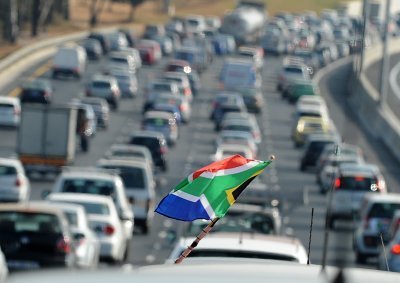Johannesburg traffic is worst in Africa

Well, that's according to an IBM-sponsored 2011 survey of 8 000 people in 20 cities who drive regularly and were asked about their level of "commuter pain" and its consequences in terms of stress, lost time and ill-health.
Vinodh Swaminathan, IBM's director of intelligent transportation systems, said the survey showed traffic congestion was down globally "but the pain of commuting is increasing".
Economic weakness and expensive fuel were two reasons for the drop in traffic congestion since the survey was first conducted in 2007, Swaminathan added. Huge investment in roads and public transport by emerging economic powers China and India had helped.
PUBLIC TRANSPORT, PLEASE
Still, 41 percent of drivers surveyed would like to kick their car to the curb and us a bus or train, the survey found.
Mexico City - with the highest driver pain index of 108 against Montreal's 21 - intends to spend more than $2-billion to ease its colossal traffic problem, Swaminathan said. "You cannot build your way out of congestion. It has to be a balance of infrastructure improvement and technology."
Stockholm, ranked fourth-best on the list of 20 cities, installed a congestion pricing system to reduce demand. The result: traffic density down 25 percent and commuting times halved.
California's drivers can obtain information on predicted road congestion based on data from road sensors. Some cities use programmable traffic lights to maintain flow.
CLEAR ROAD BENEFITS
There are clear benefits in reducing traffic, Swaminathan said, citing a study that concluded a 10 percent reduction in traffic congestion produced a two percent increase in local economic activity.
Even in cities viewed as less-trafficked, many car commuters were miserable, the study found. In Moscow, half of all drivers spent more than three hours stuck in traffic. Drivers in Beijing and Shenzhen expressed the most anger and New Delhi drivers were most likely to give up and head home rather than fight traffic.
Overall, 60 percent of city-dwellers used a car or motorcycle to commute an average of 20.6km in 33 minutes - travelling at an average speed of 37 km/h. About 13 percent travelled by bus, seven percent by train.
Stop-start traffic was the biggest complaint of drivers, followed by unreliable journey times, the slow pace and rude or aggressive drivers. One in 10 had no complaints. Which brings us to...
JOHANNESBURG 'STRESSED OUT'
More than half of drivers in Mexico City, Milan, Bangalore, and Johannesburg reported being stressed. A significant number in Chinese and Indian cities said they suffered respiratory problems while stuck in traffic.
Even so, fuel prices would have to rise 40 percent to persuade even one in five drivers to opt for a different mode of transport.
Drivers ranked Mexico City worst, followed by Shenzhen, Beijing, Nairobi, Johannesburg, Bangalore, New Delhi, Moscow, Milan, Singapore, Buenos Aires, Los Angeles, Paris, Madrid, New York, Toronto, Stockholm, Chicago, London, and Montreal.
When asked what they would do with the additional time if traffic eased, half of New York drivers said they would exercise. More than one in four drivers in Milan, Bangalore, New Delhi, Beijing, and Nairobi said they would work more.
Related News


